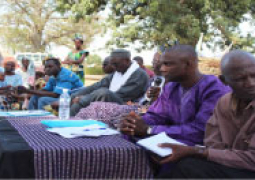The
The project will improve access to clean drinking water and safe sanitation for an estimated 65,000 people.
The Gambia Rural Water Supply and Sanitation Project is an initiative of the
A news release from the ministry of Finance and Economic Affairs said yesterday that this is expected to reduce water and sanitation related-deaths, which account for 20 percent of mortality of children under five, especially in rural areas.
At the signing ceremony, Finance minister Mambury Njie stated that “clean water supply and sanitation is crucial in the realization of any country’s development goals and poverty reduction strategies, of which The Gambia is no exception. Clean drinking water supply help in reducing health care cost as a result of the minimization of water borne diseases. This in turn will help in reducing the stress on the country’s national budget, thus redirecting some of the health care budgetary allocations into other development agendas. It’s against this backdrop that the government of the
Sering Jallow, AfDB Director, Water and Sanitation department and the African Water Facility said: “Providing access to water supply and sanitation is one of the Bank’s top priorities and the bank is glad to partner with the Government of The Gambia to widen the scope of access to adequate services in isolated regions, educate and empower populations and significantly improve their living conditions.”
The sanitation component of the project will focus on Community-Led Total Sanitation, an innovative methodology used for mobilising communities to completely eliminate open defecation. The sanitation component of the project also includes the promotion of hand washing in schools and communities, and the construction of over 1000 ventilated improved pit latrines in schools, institutions and markets.
Another important feature of the project is its integration of climate-friendly innovations, such as the use of solar energy technology in water supply pumping systems and the pilot use of ecological sanitation latrines. The solar pumping systems will in some cases replace diesel powered pumps, reducing running costs and adverse impacts on both people and the environment. Meanwhile, ecological sanitation latrines will offer retrieval and re-use of the human waste as manure for agriculture.
The authorities of the Ministry of Finance on behalf of President Yahya Jammeh, the government and people of The Gambia expressed appreciation to the African Development Bank and development partners, and assured all of their commitment to cooperate with them for the mutual benefit of our people.


